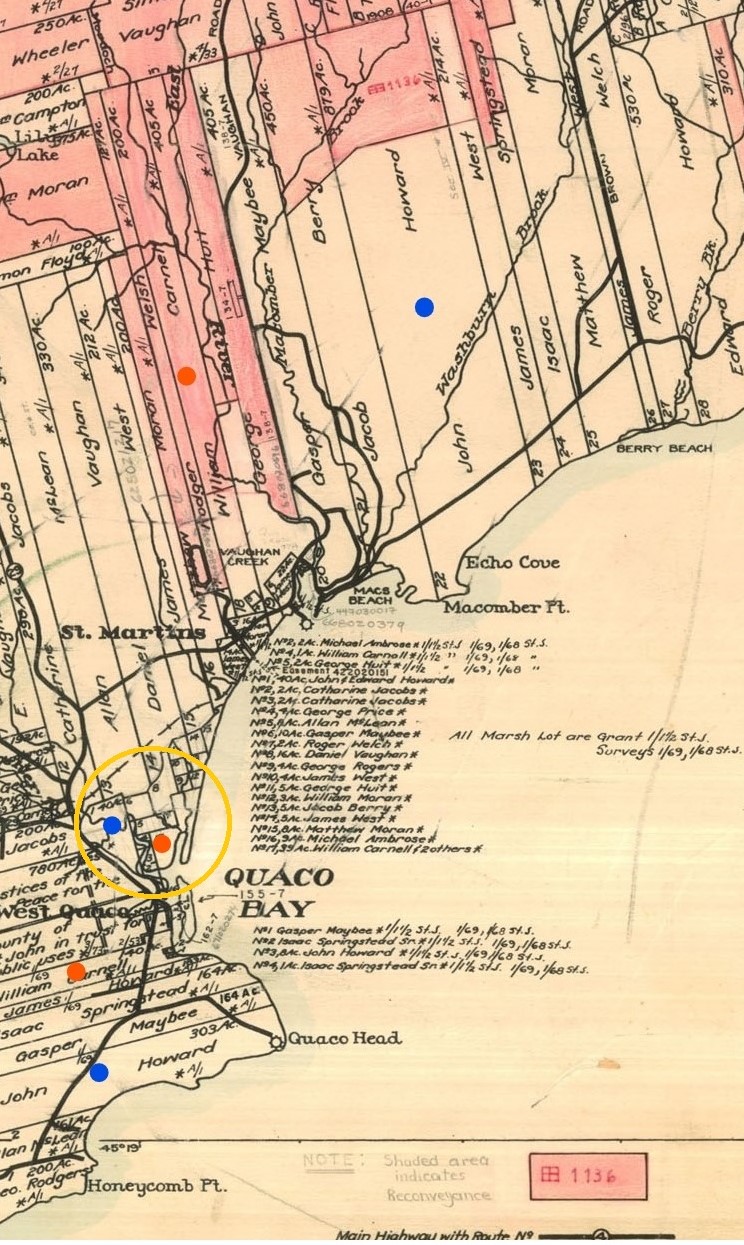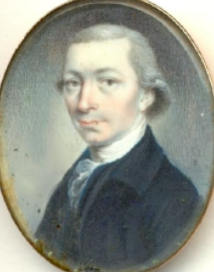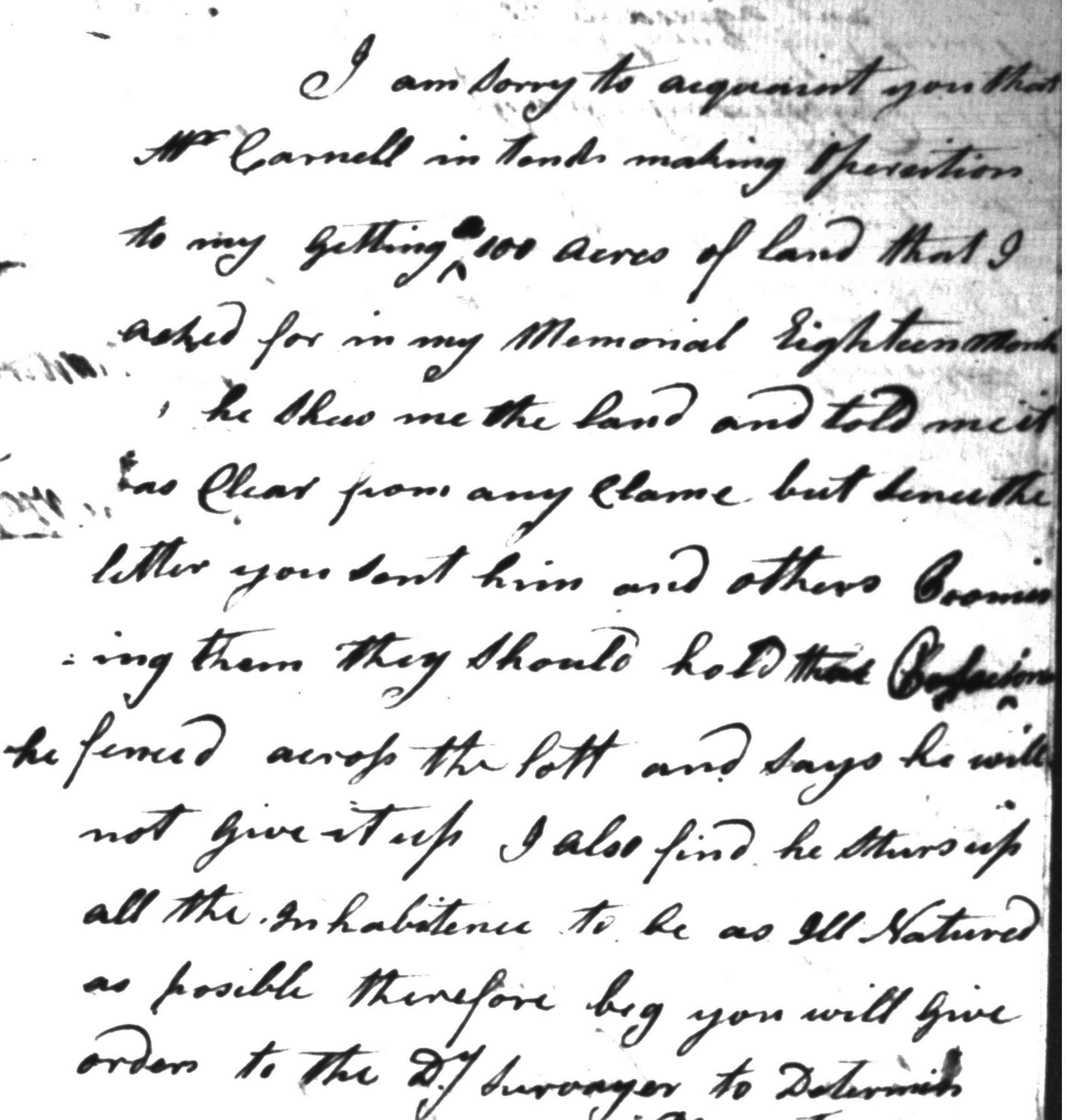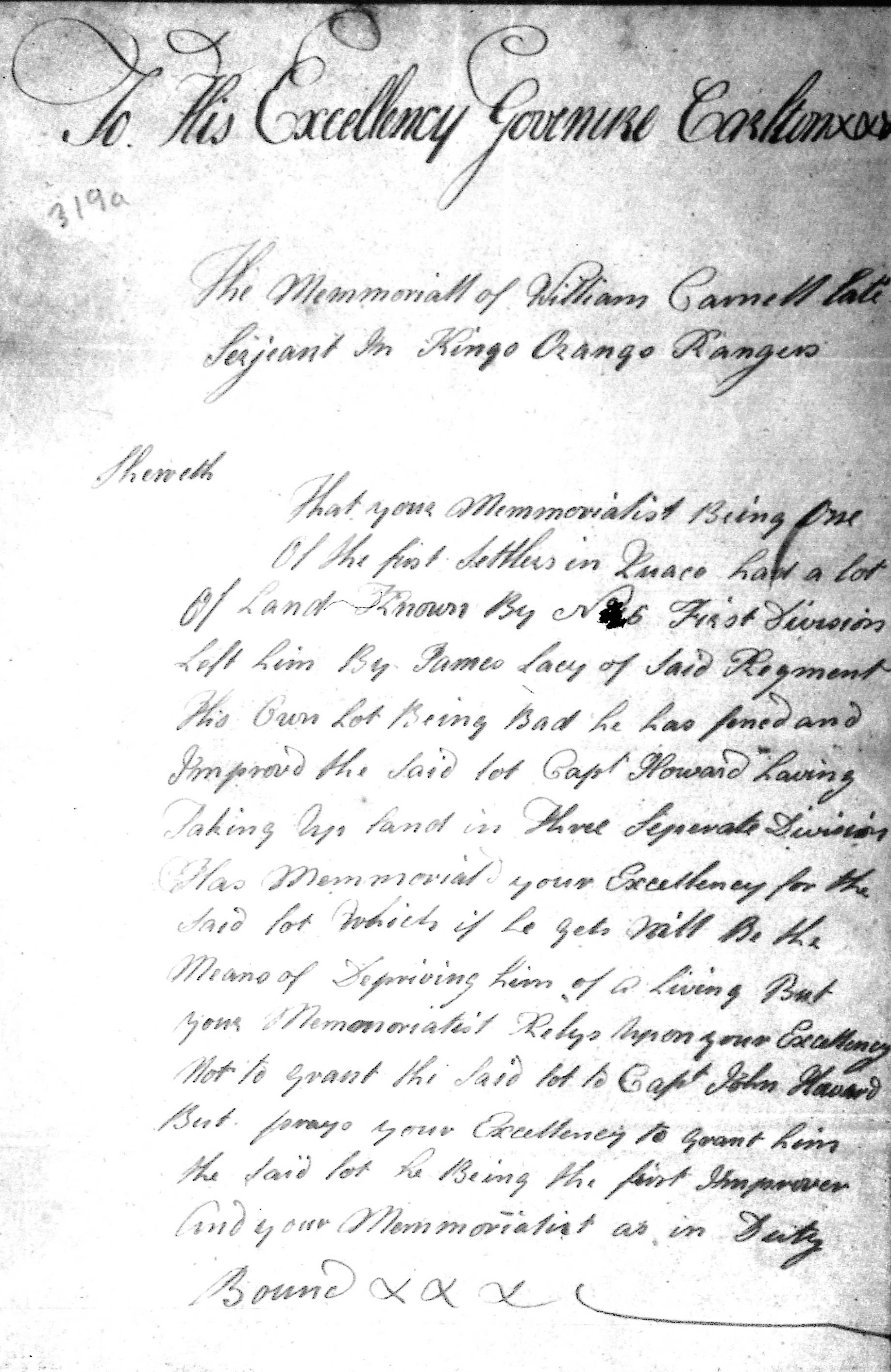- Submitted on
- 0 comments
Continued from the previous post, Two Kings Orange Rangers, Part 1.
Land Dispute in Quaco (St. Martins)
The original land grant in Quaco was made to the members of the King’s Orange Rangers (KOR) via Colonel Thomas Van Buskirk in 1784, but the majority never took up their grants. Indeed, only eight of the members were still in Quaco when the land was eventually regranted in 1796. The size of lots varied by the rank of each KOR, ranging from 900 to 100 acres. One of the key resource areas for early colonial settlers in New Brunswick was marshland, which provided valuable forage for livestock. The marsh at Quaco would become the centre of a land dispute which would span several years, focused particularly between Captain John Howard and Sergeant/ Ensign William Carnell.

(Land grant maps courtesy of the Provincial Archives of New Brunswick)
The records found among the Land Petitions of the Surveyor General of New Brunswick outline a back and forth struggle between a group of rank and file veterans of the American Revolution and one officer of social standing for the marshland that would be the key to farming success. The series of exchanges was sparked by a land petition submitted by Captain John Howard in March of 1787:
. . . in April (1785) your Memorialist Came to this Province, with a View of Setling his Land, but on Examination found his Name was not Entered in the Grant, Your Memorialist has been ever since that time with out success seeking for land to settle himself, and now finding the Greater Part of that Township Vacant, some of the Proprietors Dead other Gone and took land in the next Province, thus being the situation of that Township, Your Memorialist Humbly Prays, your Excellency will be Pleas’d to Permit him to take Possession of some of the Vacant Lotts, and also the Vacant part of a certain marsh lying within said Township . . . .
This request was “complied with” or granted days after the petition was submitted.
Howard’s land grant was quickly followed by a petition from the “Inhabitants of Quaco Late Soldiers of the Kings Orange Rangers” voicing their concerns over this act:
That your Memorialist Being The First Settlers In Quaco had a small Tract of Marsh Laid On & For the [Benefit] Of those Who should Remain hear that Since the year Eighty Seven Capt. John Howard having taking [the] Land hear In Quaco Informd the Memorialists Hear That It was your Excellency Wish That he should not Disstress the Inhabitants But Contrary to your Excellencys Commands he has Claimd the greatest part of the said Tract of Marsh . . . not only distressing to the Inhabitants hear But May Be the Means of Breaking up the Settlement. . . .
The document was signed by William Carnell, Matthias Moran, William Moran George Hewitt, Isaac Springsted Junior, Isaac Springsted Senior, Gasper Maybee, John Karr Cowill, James West, Roger Welsh, George Rogers, John Taylor, Alexander M’Clew, George Price, Allen McClew, and William Jacob. They requested that the part of Howard’s grant which held the majority of the Quaco marshland be taken back and the land arrangement stay as they had been with the earlier inhabitants.
Howard wrote to his friend, Simeon Perkins of Liverpool, on December 18, 1788 stating that he was “doing very well, has raised 70 Bushel Wheat, 40 Bush. Buck Wheat, 500 Bushel potatoes, 50 Bushel Turnips, & has hogs, of 800 wt., the Last Year.” His tactics in maneuvering for the best land in Quaco appeared to have been successful at this time.

(circa 1800, New Brunswick Museum via Wikimedia)
Jonathan Odell, Provincial Secretary, served as an intermediary with the Governor, answering the memorials of the inhabitants of Quaco and John Howard. He responded to the inhabitants of Quaco’s concerns on June 6, 1789, indicating a new grant would solve the issues especially since specific locations for each grantee were not provided on the original record:
I shall lay before His Excellency at the next meeting of Council. In the mean time . . . The first Step therefore to be taken, I suppose, will be to issue a Commission for holding an Office of Inquest respecting the whole tract, and then to order a Survey to be made, which must be at the expence of the Parties concerned, so as to fix the limits of every Settler and actual Cultivator of his respective share of the land, including his improvements with a suitable Dividend of the marsh. By this means only is it in the power of Government to secure you effectually in your several possessions.
The Inhabitants of Quaco in turn responded to Odell on June 15, 1789, arguing against the need for a new grant and the redrawing of boundaries. Instead, they emphasized the real concern was they did not have the funds or desire to redraw the boundaries of the land which they already occupied. They specifically wanted access to the marshlands writing, “if Capt. Howard gets fifty Acres of said Marsh which he said he has got granted to him It will Be the means of Starving Our Cattle . . . . We wish to have the Marsh Eaqually Amongst us all . . . .”

(New Brunswick, Surveyor General, Land Petitions: 1783-1834, Inhabitants of Quaco 1789, reel 13, originals Provincial Archives of New Brunswick)
At this point, the exchange became personal between Howard and Carnell. Only days later on June 20th, Howard wrote to Odell warning him of Carnell’s obstructive character and requesting an urgent determination by the deputy surveyor for the hundred acres requested eighteen months ago. Howard wrote of Carnell that “I also find he sturs up all the Inhabitence to be as Ill Natured as possible.” Carnell then took his turn to write a memorial (calling himself “late Serjeant In the Kings Orange Rangers”) complaining of Howard’s taking up land:
That your Memorialist Being One Of the first Settlers in Quaco had a lot Of Land Known By No. [5] First Division left him By James Lacy of said Regiment His Own Lot Being Bad he has fencd and Improved the said lot Capt Howard having Taking Up land in Three Separate Divisions Had Memmorial’d your Excellency for the said lot which if he gets will Be the Means of Depriving him of a Living. . . .

(New Brunswick, Surveyor General, Land Petitions: 1783-1834, Inhabitants of Quaco 1789, reel 13, originals Provincial Archives of New Brunswick)
Lieutenant Governor Thomas Carleton gave an order for a warrant to survey Quaco to George Sproule, Surveyor General on July 17, 1789 which was executed.
The unequal position of the two feuding parties is revealed in Howard’s next letter to Odell on August 11, 1789. At this point, Howard was likely the highest local official for the area, a magistrate, and reported on the progress of the new survey and collection of money for said survey: “I believe the greatest part will pay the Expense attending the survey without hesitation, as all the reasonable part of them Verily thinks Mr. Hayes has done them strict Justice and I am Clear that he has, In Closed with this I shall send you a state of the Expense with the reasons why not paid agains Every mans Name, I also Shall Send my Memorial for the Different Lott . . . .” He also shifted his original request for land to some back lots and additional land for his son, Edward.
Carnell, with Isaac Springsted Senior and Junior, petitioned again on August 11, 1789, stating,
Capt Howard In Order to Get the Greatist part of the Marsh Took and Run a possession fence Acrose the Best part of the Marsh that the Inhabitants Used to get hay of. And now Claims It as a gift from your Excellency . . .” An additional memorial from William Carnell states his willingness to “split the difference”: “your Memmoriallist has fenced and Inclosed six Acres one Acer & half wich is under Grain Your Memmorials lot [Jouns] it wich their [is] not More than 50 Acers Good & as Your Memmorlist has [butt] & Cleard it would be Very unconvient to move Elswhare . . . Your Memmorist Request the favour of your Excellency if Garanted not to me to let it be Divied between Capt Howard & your Memorialist so that he may not loose his improvements . . . August 1789.
Finally, in 1797, a regrant was made which included small town lots, large farm and wood lots, and marsh lots. Howard was given a significant marsh lot (whose land had been confirmed before the re-grant), but Carnell also received marsh land formally. Howard continued petitioning for wooded land in order to build a mill, and there was opposition to this desire from other members of the community such as there had been for his bid for the marsh lands.
Howard died in Hampton in 1824 aged eighty-two, while Carnell, who may have been confused with a “William Cornwall” or had his name variously recorded as “Cornell,” had a grant in Parrtown (Saint John, New Brunswick). Probate records show that “William Cornell” died in 1806 at Saint John and was a mariner by profession. He had a widow named Isabella who in her own 1815 probate had her estate valued at £150 and appeared to have no children.
Two members of the King’s Orange Rangers survived the hardships of war to come to New Brunswick only to wage a war through paper and government policy, showing the class and economic conflict which could occur even among “brothers in arms.”
Leah Grandy holds a PhD in History and works as a Microforms Assistant at the Harriet Irving Library.
Recommended Sources
Todd Braisted, Online Institute for Loyalist Studies, royalprovincial.com.
Great Britain, Audit Office, Claims, American Loyalists: Series II (AO 13): 1780 – 1835, volume 22, pp. 131-134, The Loyalist Collection,
Ross N. Hebb, Quaco-St. Martins A Brief History: The first Hundred Years, Fredericton: Quaco/Springhill Press, 1997.
John G. Leefe, “King's Orange Rangers,” Liverpool, Nova Scotia, 1996.
Provincial Archives of New Brunswick, Wallace Hale’s Early New Brunswick Probate,1785.
Edward Winslow, Papers: 1695-1866, volume 2-62, The Loyalist Collection.
Esther Clark Wright, The Ships of St. Martins: Shipbuilding, and A List of Vessels Built in St. Martins, New Brunswick 1800-1899, Saint John, NB: New Brunswick Museum, 1974.

Add new comment